> [Archived] Interviews

Interview with conductor Frederic Chaslin
On Friday, April 28th, Frederic Chaslin will conduct the National Radio Orchestra in a concert dedicated to the works of Mozart, Schumann and Rachmaninoff. The famous French artist gave us more details about his presence at Sala Radio in an interview with our colleague, IoanaȚintea.
With what feelings do you return to the stage of the Radio Hall and how do you describe the collaboration with the National Radio Orchestra?
As I also told the musicians, I am happy to return to Sala Radio because the last time we worked together was in 2020, when we conducted the last concert just before entering the lockdown caused by the pandemic. I remember that it was a very beautiful concert, with Beethoven's Fourth Symphony and "The Age of Anxiety" for piano and orchestra by Leonard Bernstein with Dana Ciocârlie as soloist. I am delighted to work with the National Radio Orchestra, but also with other ensembles from Romania. In the Jerusalem Symphony Orchestra, which I conducted for a long time, there were also Romanian instrumentalists, and they were my favorites. In general, I appreciate musicians from Romania for their special artistic spirit, unique I could say, with a special sense in interpretation.
This year marks the 150th anniversary of the birth of Sergei Rachmaninov, 2023 being the "International Rachmaninov Year". Where does this composer's Symphony No. 1 rank in your preferences?
This symphony is performed quite rarely. The orchestra likes it, it is a suitable work for this ensemble. It is also my favorite. When he wrote this work, Rachmaninov was quite young, he was experimenting, he did not have much experience in symphonic writing, and some passages are quite difficult for instrumentalists to interpret. I feel that if he had more experience he could have used a more accessible writing for musicians and in the end have the same effect.
Can you discover new meanings of this opus?
Of course, always! When I was explaining to the orchestra, especially the 2nd violin part, how this symphony should be played, I remembered a fragment from Enescu's 3rd Sonata, I told them this and everything went wonderfully. Generally, these things happen after you accumulate more knowledge, and I conducted this symphony for the first time 10 years ago.
Over the years you have collaborated with Romanian artists, and for the concert at Sala Radio you will have the cellist Răzvan Suma as a soloist. How would you describe working with Romanian musicians, in general?
As I said before, they have a special spirit, different from other musicians I've worked with. Some of my best friends in Paris are Romanian. The first Romanian pianist I met was Radu Lupu. It was when I was 20 years old and I was Daniel Barenboim's assistant. I admired Radu Lupu in the various rehearsals we participated in and appreciated the accuracy with which he interpreted each passage from the score. Before that period, I participated in a masterclass with SergiuCelibidache and I remember how strict he was with every written note but, at the same time, he was full of enthusiasm and energy, and these characteristics I found in all Romanian artists .
I haven't met Răzvan Suma yet, but I've listened to all his recordings I've found on the internet and I'm looking forward to the rehearsals.
Translated by Denisa-Elena Cincă,
University of Bucharest, Faculty of Foreign Languages and Literatures, MTTLC, year I
Corrected by Silvia Petrescu














